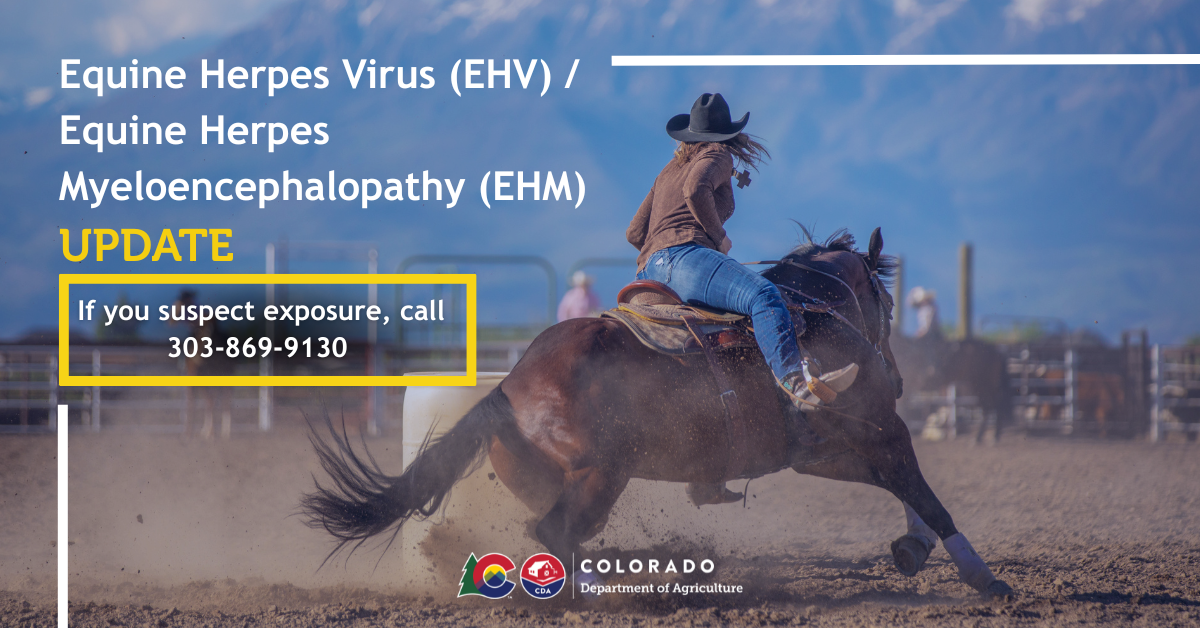The Colorado State Veterinarian’s Office is actively monitoring an outbreak of Equine Herpes Virus (EHV-1) in Texas and Oklahoma. EHV-1 is a highly contagious and sometimes fatal virus that can cause a serious neurological disease in horses called Equine Herpes Myeloencephalopathy (EHM).
This outbreak has been connected to horses that participated in or were around barrel racing and rodeo events in Texas and Oklahoma over the past several weeks. Confirmed cases of EHM have been reported in both states, and the investigation into other sick horses is ongoing.
The State Veterinarian’s Office received notification from Oklahoma and Texas identifying horses that traveled to or from these events to Colorado. Contact has been made with these owners and the exposed horses have been put under hold orders with instructions for monitoring.
One of the trace horses from the event in Waco, Texas, spiked a mild fever after returning home to Larimer county. That horse tested positive for EHV-1 on November 20 and that horse and the premises where it resides have been placed under quarantine. The horse initially developed a fever, but is now exhibiting additional neurological signs.
 “This outbreak serves as a reminder of the potential disease risks associated with large commingling equine events. It highlights the need for all horse owners to practice strong biosecurity and report any concerning signs to their veterinarian quickly,” said Colorado State Veterinarian Dr. Maggie Baldwin.
“This outbreak serves as a reminder of the potential disease risks associated with large commingling equine events. It highlights the need for all horse owners to practice strong biosecurity and report any concerning signs to their veterinarian quickly,” said Colorado State Veterinarian Dr. Maggie Baldwin.
Horse owners whose animals traveled to Texas, Oklahoma, or other equine events where EHV exposure may have occurred should immediately contact the Colorado State Veterinarian’s Office for specific guidance on isolation and monitoring.
Veterinarians are asked to report any horses with signs of acute neurologic disease directly to the State Veterinarian’s Office.
The State Veterinarian’s Office can be reached at 303-869-9130 or by emailing animalhealth@state.co.us.
Guidance for Horse Owners
If your horses traveled to Texas and Oklahoma where EHV exposure may have occurred, please contact the State Veterinarian’s Office. The following guidance for isolation and monitoring should be implemented:
- Exposed horses should be isolated for 21 days after the last known exposure.
- Appropriate isolation includes restricted access to other horses and avoiding the sharing of equipment or personnel.
- Monitor horses twice daily for:
- Elevated temperature (above 101.5°F).
- Respiratory signs (nasal discharge, coughing).
- Clinical signs consistent with EHM (neurologic symptoms including inability to stand, difficulty walking, lethargy, and urine dribbling).
- Maintain a log of temperatures and clinical signs.
Contact your private veterinarian immediately if elevated temperature, respiratory signs, or EHM-compatible clinical signs are noticed.
Guidance for Upcoming Equine Events
Equine herpes virus can be shed for prolonged periods of time, including in clinically healthy horses, which increases risk for continued disease spread. Biosecurity is critical, as EHV is a common virus present in the environment.
Event Organizers
- Consult with a veterinarian to understand the risks associated with hosting events during a multi-state outbreak.
- Consider cancellation or postponement to prevent continued spread.
- If events proceed, strongly recommend short-timed health certificates (within 72 hours) and increasing on-site biosecurity practices, such as:
- Limiting horse-to-horse contact (e.g., maintaining 30 feet between tied horses).
- Avoiding shared water tanks, buckets, tack, or grooming supplies.
- Establishing a disinfectant protocol for stabling areas.
- Sending sick horses home immediately and having a plan for an isolation pen.
Horse Owners Attending Events
- Consult with your private veterinarian on the risks associated with travel to upcoming events.
- Strictly implement biosecurity measures before, during, and after the event
Veterinarians
Reporting: If you have a horse with signs of acute neurologic disease, please contact the State Veterinarian’s Office at 303-869-9130. After-hours calls will be directed to the veterinarian on call.
Testing: Guidance on isolation and testing will be provided. Diagnosis can be difficult due to varying viral shedding. Paired samples, including nasal swab and whole blood, are critical for accurate diagnosis.
Interstate Movement
Many states may be implementing movement restrictions or new import requirements for equines during this outbreak. Always always check with the state of destination to ensure that you are following the most current import requirements.
Equine Herpes Virus Information
EHV‐1 is a highly contagious and sometimes fatal virus that is spread from horse to horse through contact with nasal discharge or spread as aerosol droplets. Infected horses may not show clinical signs of the virus but may still act as carriers.
Horses can also contract the virus by coming into contact with contaminated surfaces such as stalls, water, feed, tack, and transport vehicles. People can spread the virus from horse to horse by contaminated hands and clothing.
It is important for owners to watch for signs and symptoms and practice biosecurity measures. Good biosecurity practices include extensive cleaning and disinfection of surfaces and equipment that come in contact with affected horses, and individuals who treat or come into contact with infected horses need to follow appropriate disinfection protocols when handling multiple horses.
Visit the CDA website to see the Reportable Disease List. The Colorado Department of Agriculture State Veterinarian’s Office may be reached any time at 303-869-9130.